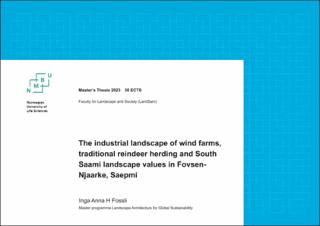| dc.contributor.advisor | Kerstin Potthoff | |
| dc.contributor.author | Fossli, Inga Anna Helene | |
| dc.date.accessioned | 2023-07-18T16:28:42Z | |
| dc.date.available | 2023-07-18T16:28:42Z | |
| dc.date.issued | 2023 | |
| dc.identifier | no.nmbu:wiseflow:6839545:54591962 | |
| dc.identifier.uri | https://hdl.handle.net/11250/3079924 | |
| dc.description.abstract | Wind power development in the Saami landscape has significant consequences for the Saami people and their way of life. The Fosen Case have led to displacement of reindeer pastures, disrupts traditional land use patterns, and generates noise and visual pollutions that negatively impact reindeer behaviour and health.
The Saami community in Fosen rely on traditional reindeer herding for their livelihoods and
cultural identity, so any threat to the herds has a profound impact. Additionally, the lack of
consultation and participation in decision-making processes further diminishes the control of Saami communities over their lands and resources.
Meaningful engagement, consideration of cumulative impacts, and appropriate mitigation
measures are crucial for a sustainable landscape approach. The chosen methods and the results emphasize implementing South Saami landscape values and traditional ecological knowledge (TEK) systems in any matter involving Saami interests. This thesis discusses different possibilities to change the current situations and how the Saami cultural landscape should look like in the future, with consent (FPIC) from the Saami people. | |
| dc.description.abstract | | |
| dc.language | eng | |
| dc.publisher | Norwegian University of Life Sciences | |
| dc.title | The industrial landscape of wind farms, traditional reindeer herding and South Saami landscape values in Fovsen-Njaarke, Saepmi | |
| dc.type | Master thesis | |
